
The German Army is the land component of the armed forces of Germany. The present-day German Army was founded in 1955 as part of the newly formed West German Bundeswehr together with the Marine and the Luftwaffe. As of January 2022, the German Army had a strength of 62,766 soldiers.

Allied Joint Force Command Brunssum (JFCBS) is a NATO command with its headquarters at Brunssum, the Netherlands. It was established in 2004, as part of a reorganisation that reduced the number of NATO Military Command Structure headquarters.

Allied Forces Northern Europe (AFNORTH) was the northern Major Subordinate Command of NATO's Allied Command Europe (ACE), located at Kolsås outside Oslo. In the case of war with the Soviet Union, AFNORTH would assume supreme command of all Allied forces in northern Europe and Germany north of Elbe/Hamburg and adjacent sea territory.

Friedrich Albert Foertsch was a German general serving during World War II and from 1961 to 1963 the second Inspector General of the Bundeswehr.

General Jörg Vollmer is a retired German Army general and served as Commander of the NATO Allied Joint Force Command Brunssum from April 2020 to June 2022. He was the Inspector of the Army from 2015 to 2020.

Egon Ramms is a retired German general who held numerous international commands. Ramms is a father of two.
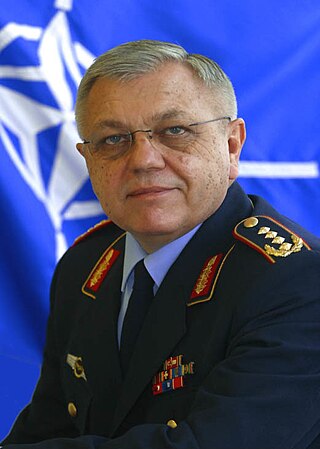
Harald Kujat is a German retired General of the Luftwaffe. He served as Chief of Staff of the German armed forces, the Bundeswehr, from 2000 to 2002, and as Chairman of the NATO Military Committee from 2002 to 2005.

Dieter Stöckmann is a retired German general of the Bundeswehr. He was Commander-in-Chief, Allied Forces Central Europe from 1996 to 1998.
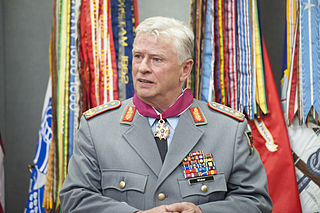
Volker Wieker is the former Chief of Staff of the Bundeswehr, the German armed forces, and a general of the German Army. Trained as an artillery officer, Wieker served in every major foreign Bundeswehr deployment since 1996, including Bosnia, Kosovo and Afghanistan.

Headquarters Allied Force Command Heidelberg was a formation of the North Atlantic Treaty Organization (NATO) responsible for providing deployable joint staff elements (DJSE) in support of NATO operations worldwide. It was headquartered at Campbell Barracks, Germany, and reported to the Joint Force Command Brunssum (JFCBS). During the War in Afghanistan, it provided command and control elements to the International Security Assistance Force (ISAF). It was disbanded on 1 April 2013.
Ferdinand Maria Johann Fridolin von Senger und Etterlin was a soldier in the German Army in both the Wehrmacht of World War II and the postwar Bundeswehr, as well as a civilian jurist in the German Federal service. As an officer in the Bundeswehr, he rose to the rank of general, and completed his military service as commander-in-chief of NATO's Allied Forces Central Europe (AFCENT). He also authored numerous books on military-related subjects.

Günter Friedrich Weiler is a retired lieutenant general of the German Army, the Bundeswehr. From 16 September 2010 until 9 April 2013, he was the Deputy Inspector General of the Bundeswehr.
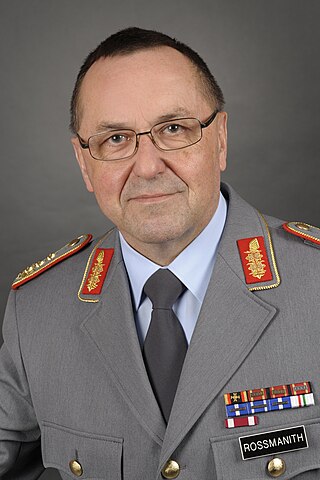
Lieutenant General Richard Rossmanith is a German Army officer and currently Commander of the Multinational Joint Headquarters Ulm in Ulm, Germany.
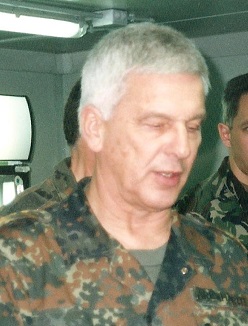
Klaus Reinhardt was a German Army general. He was the commander of the German Army Forces Command, the NATO Joint Headquarters Center, and KFOR in Kosovo. Reinhardt died on 30 November 2021, at the age of 80. He was the son of Nazi bureaucrat Fritz Reinhardt.

III Corps was a corps of the German Army active from 1957 to 1994.

The Inspector of the Army is the title held by the commander and highest ranking officer of the German Army of the modern-day German Armed Forces or Bundeswehr. The Inspector is the most senior officer to serve in the German Army and is a military adviser to the Government of Germany as well as the Ministry of Defence.

Johann Adolf Graf von Kielmansegg was a German general staff officer during the Second World War and later general of the Bundeswehr.

General Hans-Lothar Domröse is a senior German Army officer, former Commander of Allied Joint Force Command Brunssum.
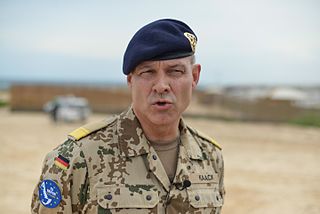
Jan Christian Kaack is a Vizeadmiral of the German Navy and as of March 11th, 2022 Inspector of the Navy.
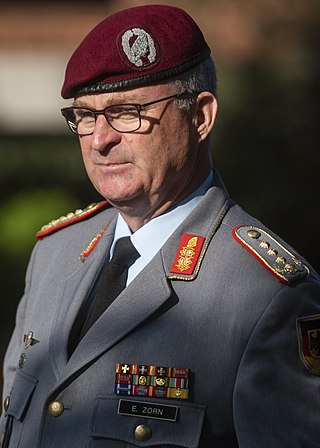
Eberhard Zorn is a retired German general who served as the 16th Inspector General of the Bundeswehr, the German Armed Forces.


















